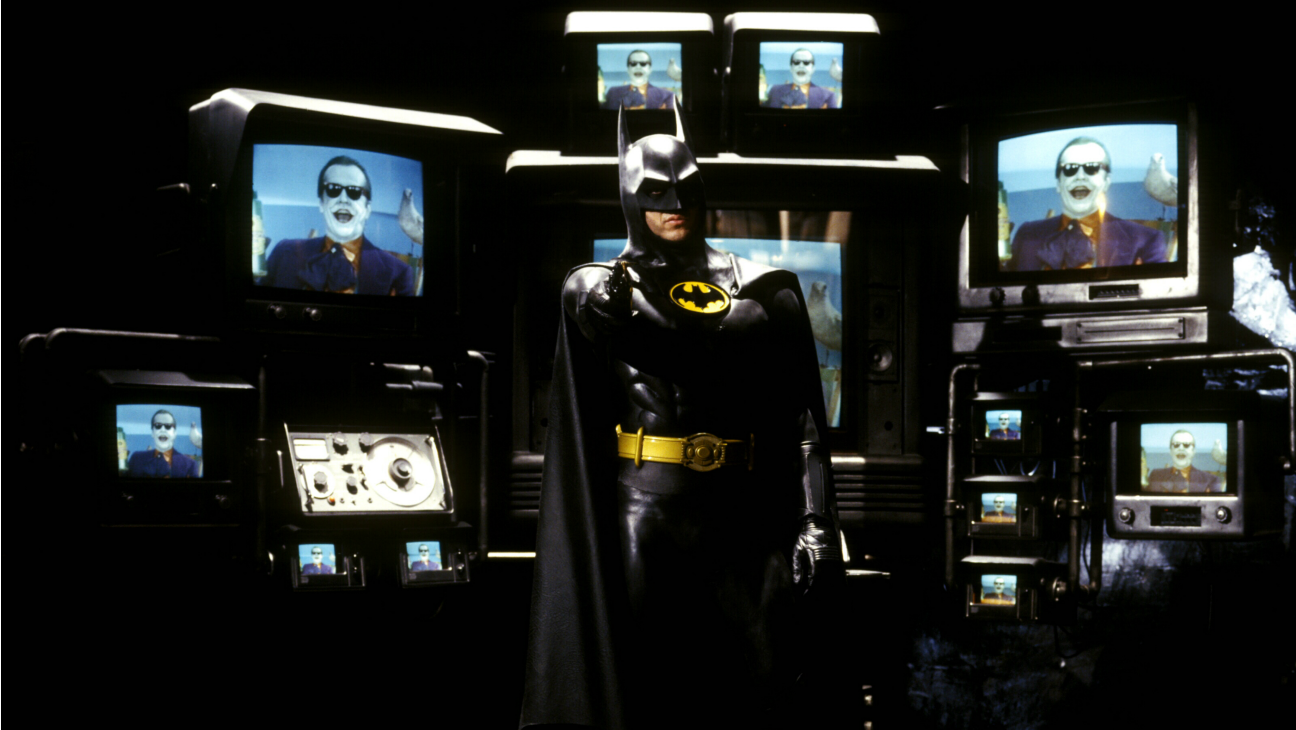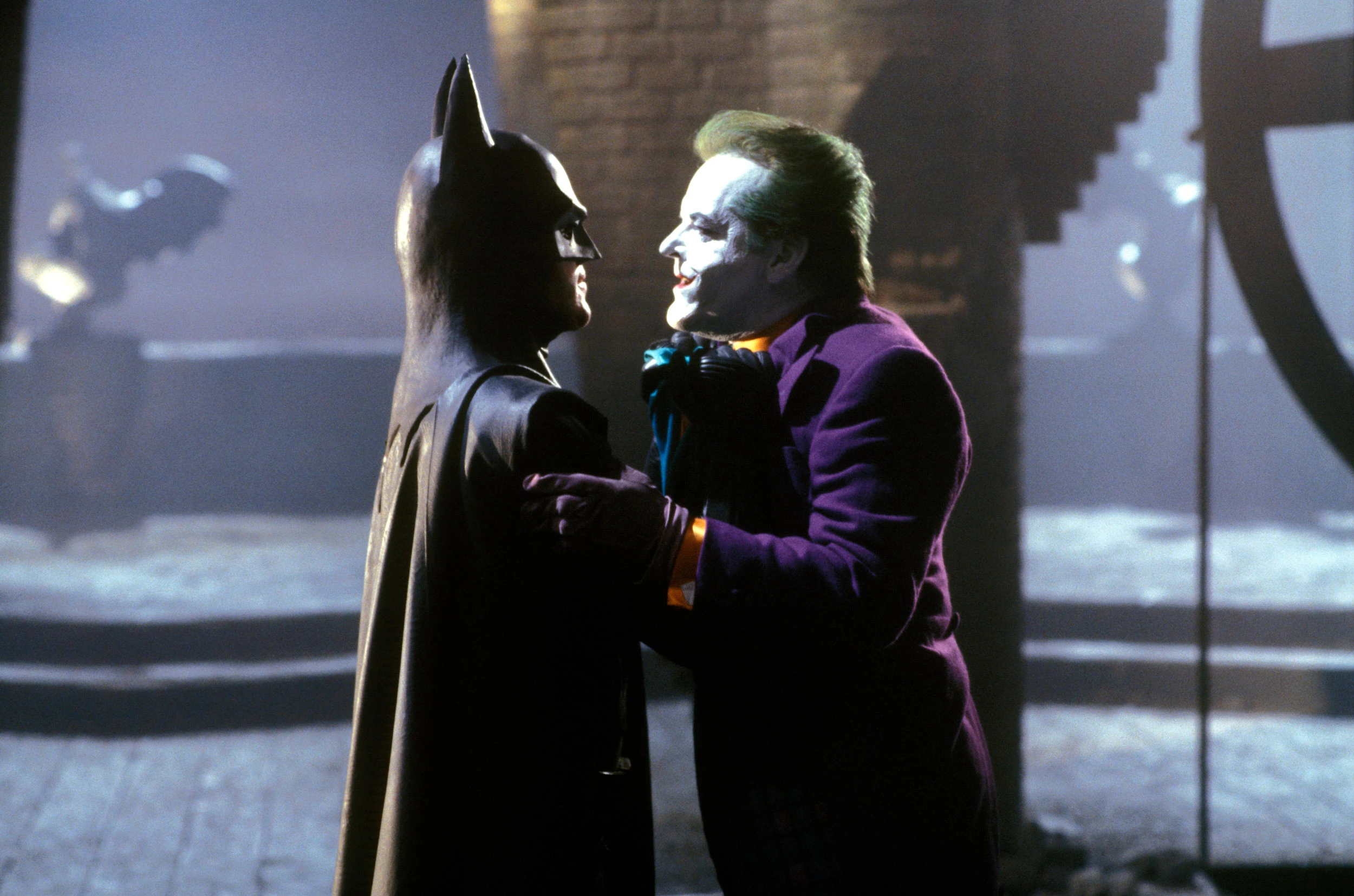For Tim Burton’s Batman, of course, all press was good press; the adage just hadn’t been invented yet. It was early—and it would be relentless.
Before the Internet and the dominance of the superhero film on its opening weekend, the front page of The Wall Street Journal might have seemed like a gift. But with a headline that announced “Batman Fans Fear The Joke’s on Them in Hollywood Epic,” the enthusiasm was far from festive for the movie’s producers, eight months before the then third most expensive film in history was to be released.

Thus began the tumultuous birth of Batman. It was one of the most influential but not the first big-budget superhero movie. It was also the first to reject the idea of an origin story from the outset and to appeal to an adult audience rather than being just a “family picture.” Batman deserves as much credit as Richard Donner’s Superman: The Movie for setting out the terms by which the superhero genre would play.
Buy Batman (1989) (4K Ultra HD + Blu-ray + Digital/Steelbook) For Just $29.96!
Superhero films and TV shows have been dominating the mainstream media for almost the last two decades now, but back then, it was a new breed of film. Something that emerged from this artistic antipathy between Richard Donner’s Superman and Time Burton’s Batman, and while that has since changed the tides of the film industry and has even oversaturated Hollywood, never will there be another superhero movie quite like Batman: a fidgety and transgressive blockbuster that still stands apart and above most of its descendants.
The Casting Controversy
The movie was under heavy scrutiny right from the get-go, and the casting of Michael Keaton as Batman had such a huge backlash that it even made the front-page news in The Wall Street Journal. Casting iconic characters has always been a heated and debated issue for Hollywood since its dawn, and this was no different.
Keaton took up the opportunity and everything that came with it and changed how the lead hero was portrayed from the tried-and-true square-jawed heroism to a much more nuanced and eccentric man, signalling that something new and different was happening. Burton and his fellow filmmakers were not trying to please fans with fidelity; instead, they were creating an exclusive vision that changed everything about which fans were previously so sure.
The 80s for Batman as a Superhero
Throughout the 1980s, Batman comics were undergoing a significant shift; they were becoming something much darker and more adult-themed than ever previously. While screenwriter Sam Hamm was wrapping up the final touches on his first draft, Frank Miller’s The Dark Knight Returns had not yet been completed—only two installments were available at that point, which were being read almost exclusively by an adult comic book readership.
However, comics were a bit niche back then, and while Batman had all these nuances and a darker and complex character that was always just itching to have been explored in the mainstream media, to the general public back then, Batman was still the silly crime fighter as portrayed in Adam West’s 1966 TV series.
Challenges of Bringing a Serious Batman into the Big Screen
Freshly minted lawyer and instructor of a college course on comic books, Michael Uslan, had spent most of ten years dedicated to bringing his vision of a Batman movie to the screen after being granted the film rights to the character from DC Comics. That was a dark, serious action flick meant to return the character to his pulpy roots. For years, Uslan was constantly dealing with the repeated rejections of a Batman movie by top executives of studios who believed that such a gamble was highly unlikely to pay off, based on the premise that an adventure film based on costumed superheroes would fail due to the failures of the movies “Robin and Marian” and “Annie.”
However, Producer Peter Guber saw potential in Uslan’s vision and signed a deal with Uslan’s Batfilm Productions Inc. This left Warner Bros. With no choice but to take back the movie rights to Batman; however, they were in a dilemma regarding how the movie should be.
Tim Burton’s Unique Vision for The Batman
When Hamm was brought in as a screenwriter in 1986, WB had already given up on various other ideas, including a 1930s-set noir Batman film and a Batman comedy.
So, Bonni Lee from Warner Bros., head of execs and who had an eye for fantastic talent, brought Tim Burton on board. He was described as a director, eccentric and dark, who had no enthusiasm for comic books whatsoever yet became fascinated with the iconography of Batman.
WRITE FOR US AND GET PAID: WE ARE LOOKING FOR CONTRIBUTORS!
He envisioned Batman as dark—almost supernatural—and that view would highly dictate the tone and style of the movie. Burton’s Batman, for instance, started with the caped crusader descending upon two junkie muggers and kept up a pace that was at once both more vampiric and Gothic than anything which preceded it in the superhero genre.
Burton managed to show that desire for revenge on his parents’ killer; thus, he transcended the character into areas that hadn’t been touched upon before.
Burton returned to the 1930s influences that galvanized Bob Kane’s original Batman. His Batman movie, owing so much to German Expressionism and film noir, presented Gotham City as a Gothic hellscape: sprawling urban decay, sans Fritz Lang’s Metropolis. Both influenced comic books and every other subsequent approach, like Batman: The Animated Series, with its naturalism in the Art Deco hellishness of Gotham.
Tim Burton’s Narrative Innovation with Batman

Batman’s story broke traditions with the narrative being told from an outsider’s point of view; the movie never played on an origin story but introduced Batman as a character of mystery whose secrets were to be unfolded – journalist Vicki Vale becomes a medium. This allowed for a more enigmatic and nuanced yet compelling portrayal of the character, something much closer to how Batman was in the comics back then and a side of him that the masses had never seen before.
READ MORE: Top 10 Most Popular Anime in Japan Right Now (2024)
While Keaton’s casting saw a huge amount of backlash, Burton had always backed him to do a great job taking up the mantle and believed that Keaton’s “crazy eyes” were what it would take to depict an obsessed and possessed Bruce Wayne. Keaton lived up to his expectations and gave an edge to his performance previously unseen onscreen, mixing intense introversion with an unsettling, almost otherworldly presence.
He has forever etched his name into the lore and legacy of Batman, and we still talk about his turn as the caped crusader very fondly, even 35 years later, and that would be the case 10 years from now as well.
Conversely, there was enthusiasm for the casting of Jack Nicholson as the Joker, and he did not disappoint. His was an exuberant and horrifying performance of the Clown Prince of Crime—one that served equally as a cross between narcissistic psychopath and dark comedy. The Nicholsonian Joker has since made its way into cinema’s pantheon, shaping and inspiring the villain for generations.
Meanwhile, Kim Basinger, in the role of Vicki Vale, also played a significant role in making the film what it is today; her character and her performance grounded the film into something closer to reality and turned the aspects that could have just as easily been seen as too fantastical, rather humane and relatable.
The Legacy of Batman Tim Burton’s Batman
Tim Burton’s Batman turned out to be a huge success both amongst the critics and the audiences, and it left such a big impression on pop culture that its influence still looms heavily in films, TV, and rather all kinds of media.
It became the first modern movie studio hype machine, and then it became the highest-grossing movie of its time, therefore creating the “Batmania” phenomenon. It also opened the doors for other successes with blockbuster status and set the blueprint for modern superhero films to follow.
Batman’s distinctive blend of dark psychology, Gothic aesthetics, and pioneering narrative set it apart in its own genre, and it still stands as a unique film, even decades later. It ventured through an unchartered terrain with recklessness and sheer artistry in ideas to render a movie that finds its echo among audiences generations later.
READ MORE: Shogun Season 2 and Season 3 in the Works at FX, Hulu
It has been 35 years since the movie hit theatres, and what a lasting influence it created for itself. It was a movie that shifted the tides amongst the whole superhero genre by presenting a darker, more complex version of Batman and eventually influenced the psyche of cinema. Burton’s Batman, in many ways, is a testament to the strength of pure creativity and just how permanent taking a huge chance with filmmaking can be.

